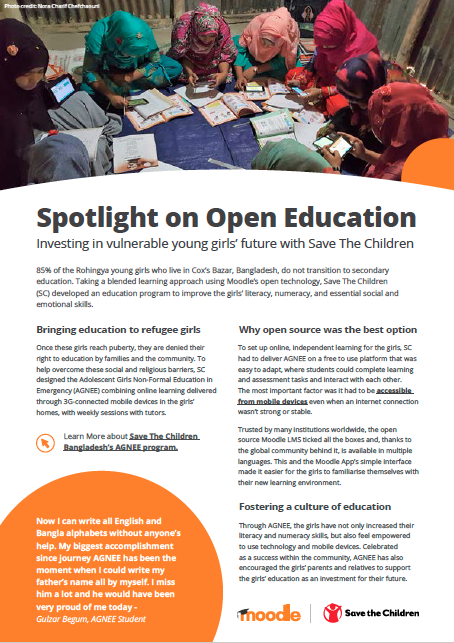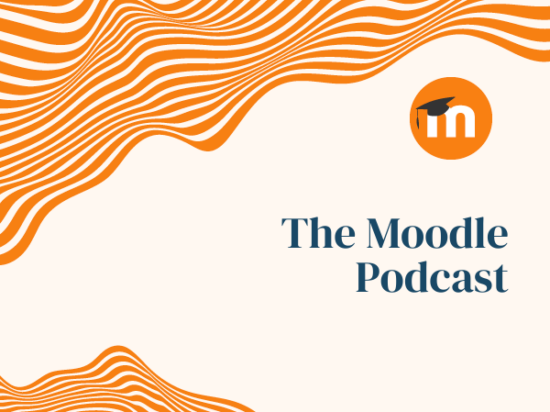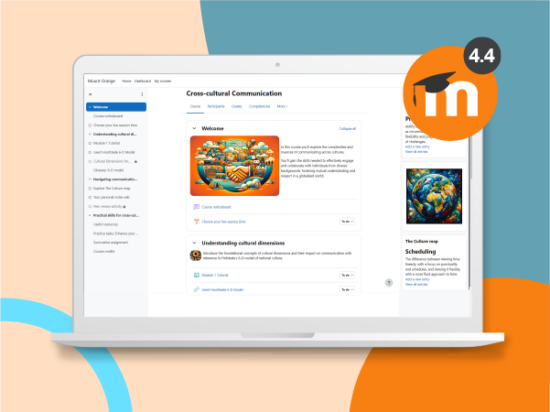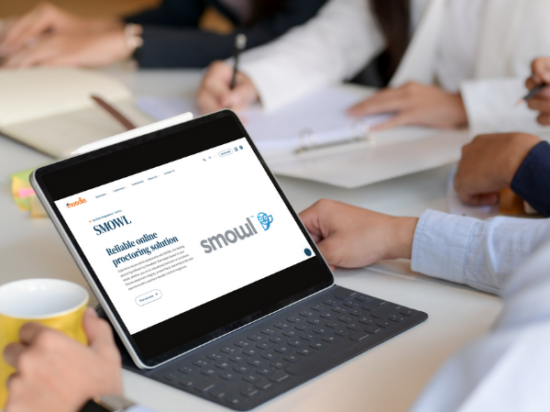In identifying that a significant proportion of adolescent girls of the Rohingya refugee population do not attend school, Save the Children designed the Adolescent Girls Non-Formal Education in Emergency (AGNEE) program, to help girls continue their education. Utilising the open source Moodle LMS, the vulnerable group of girls were able to increase their literacy and numeracy skills and improve their knowledge of technology through collaborative online learning and tutor engagement. Most importantly, the refugee community celebrated the AGNEE program’s investment in their girls’ future and role in motivating young females to continue learning.
Cox’s Bazaar is a district in southeastern Bangladesh, bordering Myanmar, with a very important Rohingya refugee population of over 1.2 million from Myanmar’s Rakhine state. When Save the Children first visited the refugee camp to assess the situation of the youngest population, they noticed that a very significant number of adolescent girls were not in school.
“We conducted a survey in the initial refugee camp we’ve been supporting for a long time since 2004, and we noticed that 85% of girls who completed their primary education, unfortunately, did not transition to secondary school”, explained Nora Charif Chefchaouni, Senior Education Advisor at Save the Children Australia.
One of the main reasons for the girls not continuing their education was that their parents and community did not want to send them to school once they reached puberty. This did not only deny the girls’ right to education but also isolated them, leaving them more vulnerable to child marriage, trafficking and child labour, generally within their own household.
To help the girls overcome these social and religious barriers and continue their education, Save the Children Bangladesh designed the Adolescent Girls Non-Formal Education in Emergency (AGNEE) program.
Taking a blended learning approach
The aim of AGNEE was to provide the Rohingya girls in Cox’s Bazar, aged from 12 to 18, with access to the national curriculum for Grade 6 and onwards so they could improve their literacy, numeracy and social and emotional learning.
Using a Human-centered design approach, which focuses on the users, their needs and requirements, as well as social and environmental factors, Save the Children started by assessing the level of literacy and numeracy of the girls, as well as their environment and how much time they’d be able to dedicate to education.
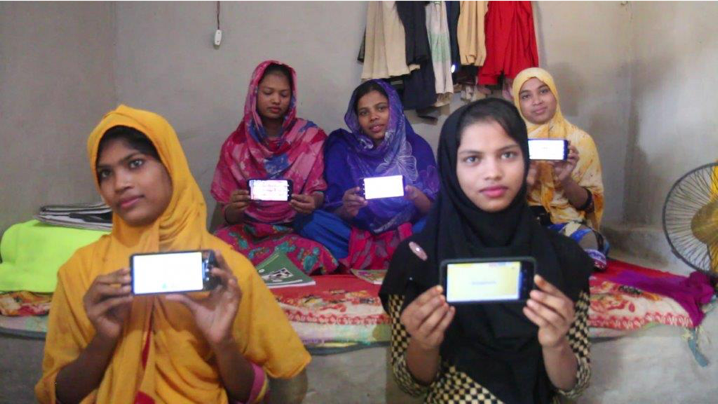
Photo credit: Swatil Binte Mahmud
As learning had to be mainly conducted in the home, Save the Children adopted a blended learning approach. Firstly, they would deliver content aligned to the Bangladesh Grade 6 – 10 curriculum, with the intent that the girls could access it online and learn independently as much as possible through 3G internet-connected mobile devices provided by the organisation.
Secondly, 7 to 9 girls were to meet around 5 days a week with a tutor to engage in peer learning, ask questions and interact with their equals. “We had to find female tutors from the girls’ community, vetted by the community. It was very likely then that these tutors would not be certified teachers and might not have the capacity to engage in remote education using technology”.
Why open source was the best option
When they had to choose a digital platform to deliver the AGNEE program, Save the Children chose the open source Moodle LMS because it was free to use and easy to adapt, extend and modify, and very importantly, was accessible from mobile devices even when the internet connection wasn’t strong or stable.
Another reason why they chose Moodle was its support for multiple languages and simple interface, which would enable the girls, but also the tutors, to familiarise themselves easier with the platform.
“I used to struggle a lot with spellings and pronunciation. Now I just press on words on my phone and the word is read out loud in correct pronunciation. This smartphone and app has made my life a lot easier” Gulzar Begum, AGNEE Student
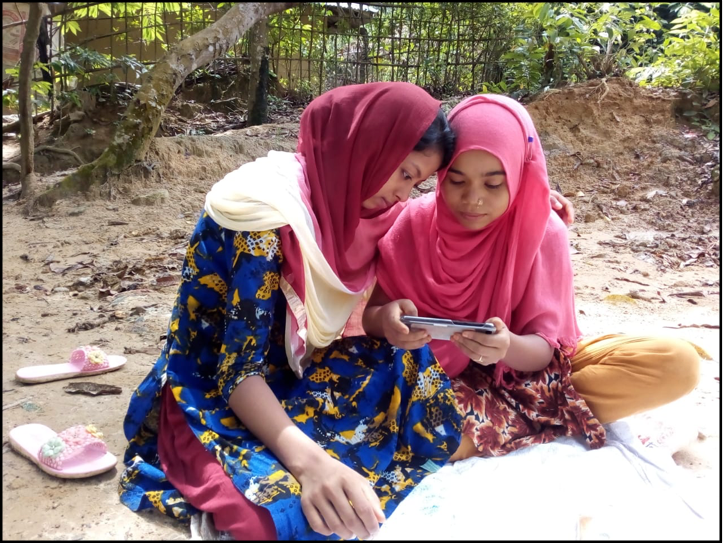
Photo credit: Swatil Binte Mahmud
Moodle’s ability to allow tutors to track progress via its assessment capabilities and its means of connecting learners via chats and forums were other reasons why Save the Children chose the platform.
The results are in the numbers
“There have been marked improvements to girls’ literacy and numeracy under AGNEE, which the comparison between the baseline and the endline clearly shows” Meherun Nahar, Project Director at Save the Children Bangladesh.
For example, using Moodle vastly improved student’s performance in the subject of English literacy; moving almost half of girls away from a basic level of understanding to advanced and/or intermediate levels. When it came to Maths, two thirds of the girls went from lower basic level into upper basic and intermediate level.
The graphic below shows the evolution of the girls, comparing their level at the end and at the start of the program:
Not only did the program enable the girls to increase their literacy and numeracy skills, but it also increased their knowledge of technology and mobile usage. After AGNEE’s intervention, the girls also learnt to use Whatsapp to communicate with each other, and exchange photos, poems and drawings.
“Now I can write all English and Bangla alphabets without anyone’s help. My biggest accomplishment since journey AGNEE has been the moment when I could write my father’s name all by myself. I miss him a lot and he would have been very proud of me today.” Gulzar Begum, AGNEE Student.
The AGNEE program was celebrated as a success within the community. Parents and teachers at Cox’s Bazar recognized just how much of an investment it was for young girls’ future, and the girls found the motivation to continue the learning beyond the reach of this program. You can read more about it on AGNEE’s hundred.org webpage.
—
Moodle supports organisations and educators worldwide with an open source, free learning platform. Donate to Moodle and help us sustain openness and quality education for all.

